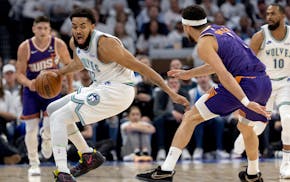Superstorm Sandy was wreaking havoc on the east coast of the United States Monday night, but as his wife, Stephanie, battened down the hatches of their New York home, Donald Fehr was in Minnesota meeting with more than 30 locked-out NHL players at an Edina hotel.
"It's their contract, it's their futures, it's their agreement and it's their union, and I work for them," said Fehr, the executive director of the NHL Players' Association. "So I go wherever they want me to be. And when the guys say they want to have a meeting, I say, 'Sure, absolutely.'"
Fehr, the former head of the Major League Baseball Players' Association, and his constituency of 725 NHLers are going nose-to-nose with a steadfast league and 30 owners determined to immediately reduce the player share of what was a $3.3 billion business from 57 percent to 50.
We're 45 days into the lockout, games have been canceled through Nov. 30, the Winter Classic is days from being axed, the league says $720 million of damage already has been done and Deputy Commissioner Bill Daly told the Star Tribune on Monday that it "seems like we are back to Square 1. ... Not sure what we do now."
Considering the two sides have not met since Oct. 18 and no future meetings are on the docket, where does it go from here?
"I don't know the answer, and believe me, I wouldn't keep it to myself if I did," Fehr said.
As players, including several from the Wild who should have been playing the Washington Capitals on Monday night, filed into a ballroom for dinner, Fehr sat down with the Star Tribune to discuss a process that "the longer it goes on, the more frustrating it becomes."
On Oct. 16, the NHL, in an effort to play an 82-game season, proposed a 50-50 split and a "make whole" concept that would pay back players over time the 12.3 percent they see in salary reductions. The kicker was it would eventually be charged to the player share.
Fehr, arm-in-arm with 18 players, responded two days later with three proposals that gradually reduced the share to 50-50. The players wanted to be paid in full. They didn't address several other systematic changes proposed by the owners -- raising the age of free agency to 28, five-year-long max contracts, reducing entry-level deals to two years, among other things.
The league's negotiators walked out of the room.
Fehr, who was mentored by Marvin Miller -- the pantheon of labor lawyers -- in baseball, has fought his entire career against the salary cap. He succeeded in baseball, exemplified by a 1994 strike that resulted in a canceled World Series.
It has led many to speculate that Fehr's ultimate objective is to attempt to rid hockey of a salary cap that was achieved by the loss of the 2004-05 season. For the league, the salary cap is the equivalent to guaranteed contracts for the players, so going after the cap would surely result in an elongated clash.
But if Fehr isn't willing to go directly to 50-50 now, will he once revenues plummet?
"The more things change, the harder it becomes," Fehr admitted. "But I'm not going to talk about future contingencies in the event we can't reach an agreement. I'm not going to discuss what we might do in other proposals down the road.
"We would still like to make an agreement and to negotiate from the proposals that we've made."
But Fehr said owners want to cut the share immediately, "which has the effect of cutting the individual contracts, including ones they just signed" hours before the lockout.
"You've got to wonder how somebody can look at themselves in the mirror when they do that," Fehr said.
Fehr admits some players are starting to fret about lost wages and their careers being in jeopardy, and that's one reason why he was in Minnesota on Monday.
"But that doesn't mean you make a bad agreement because of it," said Fehr, who planned to gauge the players' pulse Monday night, inform them of what he felt was likely next and "remind them that a negotiation is a process of constant re-evaluation."
Asked if he would prepare players for the possibility of no season, Fehr said, "You prepare them for all eventualities. You always have a concern. But I still would like to believe that the owners would like to operate the business."
Fehr's biggest frustration is the league won't return to the bargaining table despite the union's request to do with no preconditions. Daly says it's because the union won't respond to the league's Oct. 16 proposal.
"I can't make them. Haven't got a tank," Fehr said. "What we have to do is get back to the table and figure out a way to bridge it ... if they're willing."
Bobrovsky makes incredible save during Panthers-Lightning playoff game
De La Cruz powers Reds to 8-1 win to end Phillies' 7-game streak
